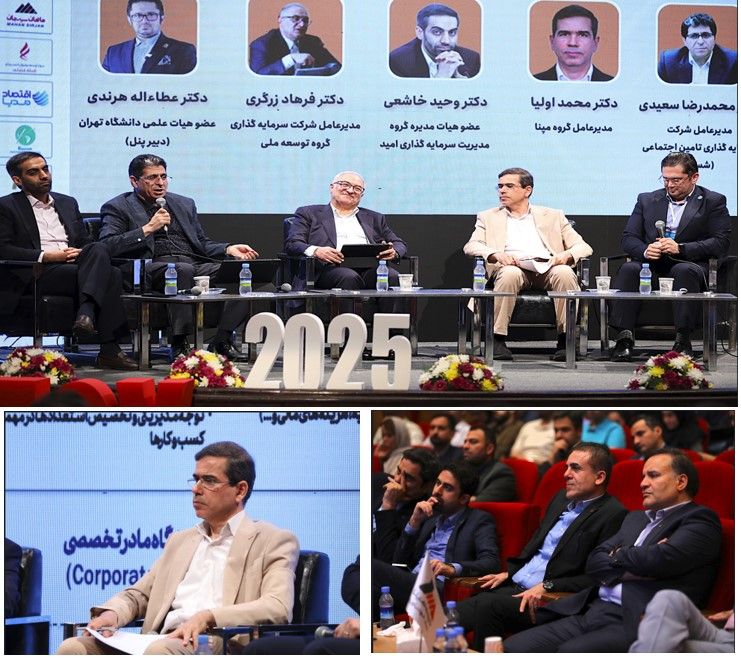The conference and the second edition of the National Strategy Award were held at the Faculty of Management, University of Tehran, on May 24–25, 2025.
The event was held with the participation of the MAPNA Group President, senior executives from major business conglomerates, university professors, researchers, and strategic management experts.
The two-day event featured a series of keynote speeches, expert panels, and academic paper presentations.
Topics included strategic foresight, national-level competitiveness, corporate governance, social responsibility, business sustainability, management under VUCAD (Volatility, Uncertainty, Complexity, Ambiguity, and Digitalization) conditions, and digital transformation.
National Strategy Award: Measuring Strategic Maturity Through a Localized Model
Coinciding with the conference was the second edition of the National Strategy Award, aimed at systematically evaluating organizations’ performance in developing and implementing effective strategies.
Based on a practical and localized assessment model, the award evaluates organizations across five key dimensions: strategic orientation, decision-making mechanisms, assets and capabilities, strategy implementation, and strategic outcomes.
Its primary objective is to enhance strategic thinking and identify successful models within Iran’s economic landscape.
Corporate Governance in Iran: Challenges and Prerequisites
A major highlight of the conference was the expert panel titled “Challenges and Prerequisites of Corporate Governance in Iran,” featuring top executives from some of the country’s largest holding companies.
Participants included the heads of MAPNA Group and Shasta, a board member from Omid Investment Group, the CEO of National Development Group, and a faculty member from the University of Tehran.
The panel focused on the practical experiences, challenges, and requirements of enterprise management in Iran.
MAPNA’s Journey in the Energy and Transportation Sectors
MAPNA Group President Mohammad Owliya, shared the company’s unique journey, emphasizing that its path to becoming a holding company differed from many others.
“For many organizations, becoming a holding company was an early strategic or investment decision. At MAPNA, it was never an initial intent. Rather, our transformation into a holding entity was an organic outcome of business development. Unlike other economic holdings, MAPNA originated from an industrial project and followed a specialized approach,” he said.
MAPNA was founded 32 years ago to manage power plant projects. It emerged from the experience of managing the Shahid Rajaee Power Plant project. With growing project scopes in the 1990s, the company identified the need to enter equipment manufacturing. In the 2000s, it started producing vital components such as turbines, generators, and control systems—marking a pivotal moment in its industrial evolution, noted Owliya.
Today, MAPNA operates in three major sectors: power, oil and gas, and transportation, all centered around energy, he said, adding, “Its strategy is grounded in sustainability, diversification, and alignment with the country’s economic realities.”
“Our approach to developing and maintaining the business portfolio naturally differs from that of other holdings,” Owliya noted. “We aim to preserve our current position and foster internal growth, which necessitates continuous updates and adjustments to our organizational strategy. This forms the basis of MAPNA’s business portfolio planning.”
He also highlighted liquidity management as a critical challenge in maintaining and growing enterprises:
“Without proper guidance of financial resources, development efforts face disruption. Liquidity management is the heartbeat of enterprise governance, acting as the key to survival, growth, and long-term vision.”
In this context, he noted that research, development, and technology advancement have played a central role in MAPNA’s operations over the past 15 years.
Reaffirming the group’s focus, he said: “Electric power, oil and gas, and transportation are the three main pillars of MAPNA’s business. Despite the complexities and sensitivities of the energy sector, we’ve strived to play an impactful role in its sustainable development.”
On the subject of new investments and phasing out non-strategic activities, Owliya explained: “In recent years, MAPNA has actively pursued a business portfolio refinement strategy. We’ve concentrated on high-value-added areas and discontinued activities that are misaligned with MAPNA’s strategic vision. This focus has been a vital part of our growth roadmap.”
Strategic Decision-Making
Continuing the panel, the MAPNA Group President responded to a question about how senior management makes decisions under complex domestic and international economic conditions.
“When an industrial enterprise becomes large and reputable, it inevitably faces broader and more complex challenges,” he said. “This holds true for MAPNA as well. Economic fluctuations, currency volatility, international dynamics, and regulatory requirements all directly influence decisions and performance.”
He added that Iran’s social and economic culture has its own structural realities, which, even with changes in international conditions, are not likely to shift quickly.
“This structure evolves slowly and must be factored into how we formulate our policies and plans. Therefore, we develop our strategies based on existing realities and the limitations—both internal and external—we face,” he explained.
Citing a specific example of complex decision-making, Owliya referred to a pivotal experience from the company’s earlier years:
“In the 1990s, MAPNA entered project execution with a contractor-oriented approach. However, in the 2000s, due to policies from state-owned clients, we moved toward equipment manufacturing and investing in private power plants. Since the 2010s, we have focused on technology-driven development and domestic innovation. In fact, Iran’s first-ever BOT (Build-Operate-Transfer) project was initiated with MAPNA’s involvement.”
He noted that the project was originally structured based on the exchange rate at the time. However, due to delays in receiving payments, MAPNA faced foreign debt challenges resulting from bank loans.
“Through persistent follow-up and negotiation, we eventually resolved part of the problem through tax settlements and debt repayments, but it was a long, difficult process involving high-stakes decisions,” Owliya said.
Leadership Stability
Responding to another question, Owliya highlighted leadership stability and its role in sustainable development. “In its 32 years of existence, MAPNA has had only three CEOs, which reflects high-level management stability. This has been a key factor in ensuring program continuity, cohesive progress, and synergy across the value chain.”
